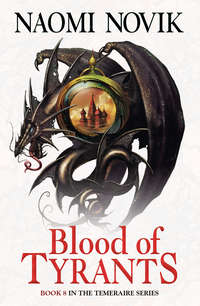
Полная версия
Tongues of Serpents
They certainly did not like Laurence; one of them had been very rude, and said, ‘For five pence I would have you down at the quarries, too,’ at which Temeraire put his head down and said, ‘For two pence I will have you in the ocean; what have you done, I should like to know, when Laurence has won a great many battles with me, and we drove Napoleon off; and you have only been sitting here. You have not even managed to raise a respectable number of cows.’
Temeraire now felt perhaps that jibe had been a little injudicious, or perhaps he ought not to have let Laurence go into town, after all, when there were people who wished to put him into quarries. ‘I will go and look for Laurence and Granby,’ he said to Iskierka, ‘and you will stay here: if you go, you will likely set something on fire, anyway.’
‘I will not set anything on fire!’ Iskierka said. ‘Unless it needs setting on fire, to get Granby out.’
‘That is just what I mean,’ Temeraire said. ‘How, pray tell, would setting something on fire do any good at all?’
‘If no one would tell me where he was,’ Iskierka said, ‘I am quite sure that if I set something on fire and told them I would set the rest on fire too, they would come about: so there.’
‘Yes,’ Temeraire said, ‘and in the meanwhile, very likely he would be in whatever house you had set on fire, and be hurt: and if not, the fire would jump along to the nearby buildings whether you liked it to or not, and he would be in one of those. Whereas I will just take the roof off a building, and then I can look inside and lift them out, if they are in there, and people will tell me anyway.’
‘I can take a roof off a building, too!’ Iskierka said. ‘You are only jealous, because someone is more likely to want to take Granby, because he has more gold on him and is much more fine.’
Temeraire swelled with indignation and breath, and would have expelled them both in a rush, but Roland interrupted urgently, saying, ‘Oh, don’t quarrel! Look, here they are all coming back, right as rain: that is them on the road, I am sure.’
Temeraire whipped his head around: three small figures had just emerged from the small cluster of buildings which made the town, and were on the narrow cattle track which came towards the promontory.
Temeraire and Iskierka’s heads were raised high, looking down towards them; Laurence raised a hand and waved vigorously, despite the twinge in his ribs, which a bath and a little rough bandaging had not gone very far to alleviate; that injury, however, could be concealed. ‘There; at least we will not have them down here in the streets,’ Granby said, lowering his own arm, and wincing a little; he probed gingerly at his shoulder.
It was still a near-run thing when they had reached the promontory – a slow progress, and Laurence’s legs wished to quiver on occasion, before they had reached the top and could sit on the makeshift benches. Temeraire sniffed, and then lowered his head abruptly and said, ‘You are hurt; you are bleeding,’ with urgent anxiety.
‘It is nothing to concern you; I am afraid we only had a little accident in the town,’ Laurence said, guiltily preferring a certain degree of deceit to the inevitable complications of Temeraire’s indignation.
‘So, dearest, you see it is just as well I wore my old coat,’ Granby said to Iskierka, in a stroke of inspiration, ‘as it has got dirty and torn, which you would have minded if I had on something nicer.’
Iskierka was thus diverted to a contemplation of his clothing, instead of his bruises, and promptly pronounced it a natural consequence of the surroundings. ‘If you will go into a low, wretched place like that town, one cannot expect anything better,’ she said, ‘and I do not see why we are staying here, at all; I think we had better go straight back to England.’
Chapter Two
‘I am not surprised in the least,’ Bligh said, ‘in the least; you see exactly how it is now, Captain Laurence, with these whoreson dogs and Merinos.’
His language was not much better than that of the aforementioned dogs, and neither could Laurence much prefer his company. He did not like to think so of the King’s governor and a Navy officer, and particularly not one so much a notable seaman: his feat of navigating 3600 miles of open ocean in only a ship’s launch, when left adrift by the Bounty, was still a prodigy.
Laurence had looked at least to respect, if not to like; but the Allegiance had stopped to take on water in Van Diemen’s Land, and there found the governor they had confidently expected to meet in Sydney, deposed by the Rum Corps and living in a resentful exile. He had a thin, soured mouth, perhaps the consequence of his difficulties; a broad forehead exposed by his receding hair and delicate, anxious features beneath it, which did not very well correspond with the intemperate language he was given to unleash on those not uncommon occasions when he felt himself thwarted.
He had no recourse but to harangue passing Navy officers with demands to restore him to his post, but all of those prudent gentlemen, to date, had chosen to stay well out of the affair while the news took the long sea-road back to England for an official response. This, Laurence supposed, had been neglected in the upheaval of Napoleon’s invasion and its aftermath; nothing else could account for so great a delay. But no fresh orders had come, nor a replacement governor, and meanwhile in Sydney the New South Wales Corps, and those men of property who had promoted their coup, grew all the more entrenched.
The very night the Allegiance put into the harbour, Bligh had himself rowed out to consult with Captain Riley; he had very nearly asked himself to dinner, and directed the conversation with perfect disregard for Riley’s privilege; though as a Navy man himself he could not be ignorant of the custom.
‘A year now, and no answer,’ Bligh had said in a cloud of spittle and fury, waving his hand to Riley’s steward to send the bottle round to him again. ‘A full year gone, Captain, and meanwhile in Sydney these scurrilous worms yet inculcate all the populace with licentiousness and sedition: it is nothing to them, nothing, if every child born to woman on these shores should be a bastard and a bugger and a drunken leech, so long as they do a little work upon their farms, and lie quiet under the yoke: let the rum flow is their only maxim, the liquor their only coin and god.’ He did not, however, stint himself of the wine, near-vinegar though it was, nor the last dregs of Riley’s port; ate well, also, as might a man living mostly on hardtack and a little occasional game.
Laurence, silent, rolling the stem of his glass between his fingers, could not but feel some sympathy: a little less of self-restraint, and he might have railed with as much fervour, against the cowardice and stupidity which had united to send Temeraire into exile. He too wished to be restored, if not to rank or to society, at least to a place where they might be useful; and not to merely sit here on the far side of the world upon a barren rock, and complain unto heaven.
But now Bligh’s downfall might as easily be his own: his one hope of return had been a pardon from the colony’s governor, for himself and Temeraire; or at least enough of a good report to reassure those in England whose fears and narrow interest had seen them sent away.
It had always been a scant hope, a little threadbare; but Jane Roland certainly wished for the return of Britain’s one Celestial, when she had Lien to contend with on the enemy’s side. Laurence might have some hope that the nearly superstitious fear of the breed which had sprung up, after the dreadful carnage of Lien’s attack upon the Navy, at the battle of Shoeburyness, was beginning to subside, and cooler minds regret the impulse which had sent away so valuable a weapon.
At least, so she had written, encouragingly; and had advised him, ‘I may have a prayer of sending the Viceroy to fetch you home, when she has been refit; only for God’s sake be obliging to the Governor, if you please; and I will thank you not to make any more great noise of yourself: it would be just as well if there is not a word to be said of you in the next reports from the colony, good or evil, but that you have been meek as milk.’
Of that, however, there was certainly no hope, from the moment when Bligh had blotted his lips and thrown down his napkin and said, ‘I will not mince words, Captain Riley: I hope you see your duty clear under the present circumstances, and you as well, Captain Granby,’ he added.
This was, of course, to carry Bligh back to Sydney, there to threaten the colony with bombardment or pillage, at which the ringleaders MacArthur and Johnston would be handed over for judgment. ‘And to be summarily hanged like the mutinous scoundrels they are, I trust,’ Bligh said. ‘It is the only possible repair for the harm which they have done: by God,I should like to see their worm-eaten corpses on display a year and more, for the edification of their fellows; then we may have a little discipline again.’
‘Well, I shan’t,’ Granby said, incautiously blunt, ‘and,’ he added to Laurence and Riley privately, afterwards, ‘I don’t see as we have any business telling the colony they shall have him back: it seems to me after a fellow has been mutinied against three or four times, there is something to it besides bad luck.’
‘Then you shall take me aboard,’ Bligh said, scowling when Riley had also made his more polite refusal. ‘I will return with you to England, and there present the case directly; so far, I trust, you cannot deny me,’ he asserted, with some truth: such a refusal would have been most dangerous politically to Riley, whose position was less assured than Granby’s, and unprotected by any significant interest. But Bligh’s real intention, certainly, was to return not to England but to the colony, in their company and under Riley’s protection with the intention meanwhile of continuing his attempts at persuasion however long they should remain there in port.
It was not to be supposed that Laurence could put himself at Bligh’s service, in that gentleman’s present mood, without at once being ordered to restore him to his office and to turn Temeraire upon the rebels. Even if such a course should serve Laurence’s self-interest, it was wholly inimical to his every feeling. He had allowed himself and Temeraire to be so used once – by Wellington, against the French invaders during Britain’s greatest extremity; it had still left the blackest taste in his mouth, and he would never again so submit.
Yet equally, if Laurence put himself at the service of the New South Wales Corps, he became nearly an assistant to mutiny. It required no great political gifts to know this was of all accusations the one which he could least afford to sustain, and the one which would be most readily believed and seized upon by his enemies and Temeraire’s, to deny them any hope of return.
‘I do not see the difficulty; there is no reason why you should surrender to anyone,’ Temeraire said obstinately, when Laurence had in some anxiety raised the subject with him aboard ship as they made the trip from Van Diemen’s Land to Sydney: the last leg of their long voyage, which Laurence formerly would have advanced with pleasure, and now with far more pleasure would have delayed. ‘We have done perfectly well all this time at sea, and we will do perfectly well now, even if a few tiresome people have been rude.’
‘Legally, I have been in Captain Riley’s charge, and may remain so a little longer,’ Laurence answered. ‘But that cannot answer for very long: ordinarily he ought to discharge me to the authorities with the rest of the prisoners.’
‘Whyever must he? Riley is a sensible person,’ Temeraire said, ‘and if you must surrender to someone, he is certainly better than Bligh. I cannot like anyone who will insist on interrupting us at our reading, four times, only because he wishes to tell you yet again how wicked the colonists are and how much rum they drink: why that should be of any interest to anyone I am sure I do not know.’
‘My dear, Riley will not long remain with us,’ Laurence said. ‘A dragon transport cannot simply sit in harbour; this is the first time one has been spared to this part of the world, and that only to deliver us. When she has been scraped, and the mizzen topmast replaced, from that blow we had near the Cape, they will go; I am sure Riley expects fresh orders very nearly from the next ship into harbour behind us.’
‘Oh,’ Temeraire said, a little downcast, ‘and we will stay, I suppose.’
‘Yes,’ Laurence said, quietly. ‘I am sorry.’
And without transport, Temeraire would be quite truly a prisoner of their new situation: there were few ships, and none of merchant class, which could carry a dragon of Temeraire’s size, and no flying route which could safely see him to any other part of the world. A light courier, built for endurance, perhaps might manage it in extremis with a well-informed navigator, clear weather, and luck, setting down on some deserted and rocky atolls for a rest; but the Aerial Corps did not risk even them on any regular mission to the colony, and Temeraire could never follow such a course without the utmost danger.
And if any degree of persuasion on Granby’s part could manage it, he and Iskierka would go as well, when Riley did, to avoid a similar entrapment; leaving Temeraire quite isolated from his own kind, save for the three prospective hatchlings who were as yet an unknown quantity.
‘Well, that is nothing to be sorry for,’ Temeraire said, rather darkly eyeing Iskierka, who at present was asleep and exhaling quantities of steam from her spikes upon his flank, which gathered into fat droplets and rolled off to soak the deck beneath him. ‘Not,’ he added, ‘that I would object to company; it would be pleasant to see Maximus again, and Lily, and I would like to know how Perscitia is getting on with her pavilion; but I am sure they will write to me when we are settled, and as for her, she may go away any time she likes.’
Laurence felt Temeraire might find it a heavier penalty to be exacted than he yet knew. Yet the prospect of these miseries, which had heretofore on their journey greatly occupied his concerns, seemed petty in comparison with the disaster of the situation that now awaited them: trapped in the roles of convict and kingmaker both, and without any means of escape, save if they chose to sacrifice all intercourse with society and take themselves off into the wilderness.
‘Pray do not worry, Laurence,’ Temeraire said stoutly. ‘I am sure we will find it a very interesting place, and anyway,’ he added, ‘at least there will be something nicer to eat.’
Their reception, however, had if anything only given more credence to Bligh’s representations, and Laurence’s anxiety. The Allegiance could not be said to have crept up on the colony: she had entered the mouth of the harbour at eleven in the morning on a brilliantly clear day, with only the barest breath of wind to bring her along. After eight months at sea, all of them might have been pardoned for impatience, but no one could be immune to the almost shocking loveliness of the immense harbour: one bay after another curving off the main channel, and the thickly forested slopes running down to the water, interspersed with stretches of golden sand.
So Riley did not order out the boats for rowing, or even try to spread a little more sail; he let the men mostly hang along the rail, looking at the new country before them while the Allegiance stately glided among the smaller shipping like a great finwhale among clouds of baitfish. Nearly three hours of slow, clear sailing before they lowered the anchor, then, but still there was no welcome come to meet them.
‘I will fire a salute, I suppose,’ Riley said, doubtfully; and the guns roared out. Many of the colonists in their dusty streets turned to look, but still no answer came, until after another two hours at last Riley put a boat over the side, and sent Lord Purbeck, his first lieutenant, ashore.
Purbeck returned shortly to report he had spoken with Major Johnston, the present chief of the New South Wales Corps, but that gentleman refused to come aboard so long as Bligh was present: the intelligence of Bligh’s return had evidently reached Sydney in advance, likely by some smaller, quicker ship making the same passage from Van Diemen’s Land.
‘We had better go see him ourselves, then,’ Granby said, quite unconscious of the appalled looks Laurence and Riley directed at him, at the proposal that a Navy captain should lower himself to call upon an Army major, who had behaved so outrageously and ungentlemanly, and unfortunately added, ‘It don’t excuse him, but I would not have put it past that fellow Bligh to send word ahead himself that we were here to put him back in his place,’ sadly plausible; and to make matters worse, there was little alternative. Their stores were running low, and that was no small matter with the hold crammed full of convicts, and the deck weighted down with dragons.
Riley went stiffly, with a full complement of Marines, and invited Laurence and Granby both to accompany him. ‘It may not be regular, but neither is anything else about this damned mess,’ he said to Laurence, ‘and I am afraid you will need to get the measure of the fellow, more than any of us.’
It was not long in coming: ‘If you mean to try and put that cowering snake over us again, I hope you are ready to stay, and swallow his brass with us,’ Johnston said, ‘for an you go away, we’ll have him out again in a trice; for my part, I will answer to anyone who has a right to ask it for what I have done, which isn’t any of you.’
These were the first words uttered, preceding even introduction, as soon as they had been shown into his presence: not into an office, but only the antechamber in the single long building which served for barracks and headquarters both.
‘What that has to do with hailing a King’s ship properly when it comes into harbour, I would like to know,’ Granby said heatedly, responding in kind, ‘and I don’t care two pence for Bligh or you, either, until I have provision for my dragon; which you had better care about, too, unless you like her to help herself.’
This exchange had not made the welcome grow particularly warmer: even apart from the suspicion of their assisting Bligh, Johnston was evidently uneasy for all his bluster, as well might he and his fellows be with their present arrangements, at once illegal and unsettled, with so long a silence from England. Laurence might have felt some sympathy for that unease, under other circumstances: the Allegiance and her dragon passengers came into the colony as an unknown factor, and with the power of disrupting all the established order.
But the first sight of the colony had already shocked him very much: in this beautiful and lush country, to find such a general sense of malaise and disorder, women and men staggering-drunk in the streets even before the sun had set, and for most of the inhabitants thin ramshackle huts and tents the only shelters. Even these were occupied irregularly: as they walked towards their unsatisfactory meeting, and passed one such establishment with no door whatsoever, Laurence glanced and was very shocked to see within a man and a woman copulating energetically, he still half in military uniform, while another man snored sodden upon the floor and a child sat dirty and snuffling in the corner.
More distressing still was the bloody human wreckage on display at the military headquarters, where an enthusiastic flogger seemed to scarcely pause between his customers, a line of men shackled and sullen, waiting for fifty lashes or a hundred – evidently their idea of light punishment.
‘If I would not soon have a mutiny of my own,’ Riley said, half under his breath, as they returned to the Allegiance, ‘I would not let my men come ashore here for anything; Sodom and Gomorrah are nothing to it.’
Three subsequent weeks in the colony had done very little to improve Laurence’s opinion of its present or its former management. There was nothing in Bligh himself which could be found sympathetic: in language and manner he was abrupt and abrasive, and where his attempts to assert authority were balked, he turned instead to a campaign of ill-managed cajolery, equal parts insincere flattery and irritated outbursts, which did little to conceal his private conviction of his absolute righteousness.
But this was worse than any ordinary mutiny: he had been the royal governor, and the very soldiers responsible for carrying out his orders had betrayed him. Riley and Granby continuing obdurate, and likely soon to be gone, Bligh had fixed upon Laurence as his most promising avenue of appeal, and refused to be deterred; daily now he would harangue Laurence on the ill-management of the colony, the certain evils flowing from permitting such an illegitimate arrangement to continue.
‘Have Temeraire throw him overboard,’ Tharkay had suggested laconically, when Laurence had escaped to his quarters for a little relief and piquet, despite the nearly stifling heat belowdecks: the open window let in only a still-hotter breeze. ‘He can fish him out again after,’ he added, as an afterthought.
‘I very much doubt if anything so mild as ocean water would prove effective at dousing that gentleman’s ardour for any prolonged time,’ Laurence said, indulging from temper in a little sarcasm: Bligh had gone so far today as to overtly speak of his right, if restored, to grant full pardon, and Laurence had been forced to quit him mid-sentence to avoid taking insult at this species of attempted bribery. ‘It might nearly be easier,’ he added more tiredly, the moment of heat past, ‘if I did not find some justice in his accusations.’
For the evils of the colony’s arrangements were very great, even witnessed at the remove of their shipboard life. Laurence had understood that the convicts were generally given sentences of labour, which being accomplished without further instance of disorder yielded their emancipation and the right to a grant of land: a thoughtful design envisioned by the first governor, intended to render them and the country both settled. But over the course of the subsequent two decades, this had remained little more than a design, and in practice nearly all the men of property were the officers of the New South Wales Corps or their former fellows.
The convicts at best they used as cheap labour; at worst, as chattels. Without prospects or connections to make them either interested in their future or ashamed of their behaviour, and trapped in a country that was a prison which needed no walls, the convicts were easily bribed to both labour and their own pacification with cheap rum, brought in at a handsome profit by the soldiers, and in such a way those who ought to have enforced order instead contributed to its decay, with no care for the disorder and self-destruction they thus engendered.
‘Or at least, so Bligh has argued, incessantly, and everything which I have seen bears him out,’ Laurence said. ‘But Tenzing, I cannot trust myself; I fear that I wish the complaints to be just, rather than know they are so. I am sorry to say it would be convenient to have an excuse to restore him.’
‘There is capot, I am afraid,’ Tharkay said, putting down his last card. ‘If you insist on achieving justice and not only convenience, you would learn more from speaking with some local citizen, a settled man, with nothing to complain of in his treatment on either side.’
‘If such a man is to be found, I can see no reason he would willingly confide his opinion, in so delicate a matter,’ Laurence said, throwing in, and gathering the cards up to sort out afresh.
‘I have letters of introduction to some few of the local factors,’ Tharkay said, a piece of news to Laurence, who wondered; so far as he knew, Tharkay had only come to New South Wales to indulge an inveterate wanderlust; but of course he could not intrude upon Tharkay’s privacy with a direct question.
‘If you like,’ Tharkay had continued, ‘I can make inquiries; and as for reason, if there is discontent enough to form the grounds for your decision, I would imagine that same discontent sufficient motive to speak.’






